
Joseph Georges Gonzague Vézina was a Canadian professional ice hockey goaltender who played seven seasons in the National Hockey Association (NHA) and nine in the National Hockey League (NHL), all with the Montreal Canadiens. After being signed by the Canadiens in 1910, Vézina played in 327 consecutive regular season games and a further 39 playoff games, before leaving early during a game in 1925 due to illness. Vézina was diagnosed with tuberculosis, and died on March 27, 1926.
The 1918–19 NHL season was the second season of the National Hockey League (NHL). While at first it was uncertain that the NHL would operate, and the possibility that National Hockey Association (NHA) would be resumed, the unfinished business of Eddie Livingstone's Toronto and Ottawa's NHA franchise, led to the NHL owners suspending the NHA again. Livingstone would attempt to overthrow the NHA management, and failing that, attempt to operate a rival league. The pre-season was filled with legal actions, deceptions and public verbal attacks. Ultimately, the NHL operated with three teams, in Montreal, Ottawa and Toronto. However, the season ended early with Toronto suspending operations, leaving Montreal and Ottawa to play off for the championship. Montreal would win the playoff and travel to Seattle for the Stanley Cup Finals. However, the championship series was not completed due to influenza infecting the whole Montreal team and causing the eventual death of Montreal's Joe Hall.
The Seattle Metropolitans were a professional ice hockey team based in Seattle, Washington, playing in the Pacific Coast Hockey Association (PCHA) from 1915 to 1924. During their nine seasons, the Metropolitans were the PCHA's most successful franchise, as they went 112–96–2 in their nine years as a franchise. The Metropolitans also won the most regular season PCHA championships, winning five times, with Seattle finishing second on three other occasions. The Metropolitans played their home games at the 2,500 seat Seattle Ice Arena located downtown at 5th and University.
The 1919–20 NHL season was the third season of the National Hockey League (NHL). A Quebec team was activated by the NHL, increasing the number of teams to four. The four teams played 24 games in a split-schedule format. The Ottawa Senators won the league championship by winning both halves of the split-season. The Senators went on to win the Stanley Cup for the first time since the Cup challenge era ended and their eighth time overall, by defeating the PCHA's Seattle Metropolitans three games to two in a best-of-five series in the Stanley Cup Finals.

Frank Corbett "Flash" Foyston was a Canadian professional ice hockey player and coach. Foyston was a member of Stanley Cup championship teams three times: with the Toronto Blueshirts in 1914, the Seattle Metropolitans in 1917, and the Victoria Cougars in 1925. While with the Metropolitans, he twice led the Pacific Coast Hockey Association (PCHA) in goals. After his retirement from playing, Foyston became a minor league head coach. He was inducted into the Hockey Hall of Fame in 1958.
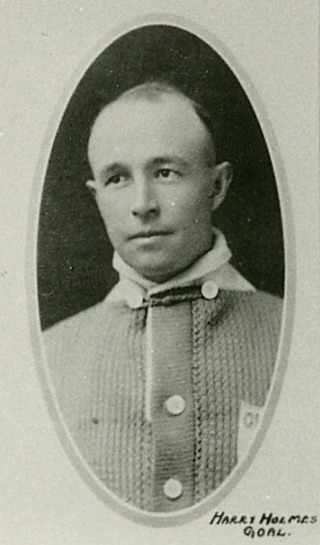
Harry George "Hap" Holmes was a Canadian professional ice hockey goaltender. As a professional, Holmes won the Stanley Cup four times, with four teams. He tied the record of his 1914 Stanley Cup winning Toronto Blueshirts teammate Jack Marshall, who also won Cups with four teams. No other player has duplicated this record.

John Phillip "Jack" Walker was a Canadian professional ice hockey forward who played for the Toronto Blueshirts, Seattle Metropolitans, Victoria Cougars, and Detroit Cougars. He played in all the big professional leagues at the time: the National Hockey Association (NHA), Pacific Coast Hockey Association (PCHA), Western Canada Hockey League (WCHL), and National Hockey League (NHL).
The 1974–75 NHL season was the 58th season of the National Hockey League. Two new teams, the Washington Capitals and Kansas City Scouts, were added, increasing the number of teams to 18. To accommodate the new teams, the NHL re-organized its divisional structure and playoff format. The regular season was expanded to 80 games per team. The Philadelphia Flyers won the Stanley Cup for the second consecutive year.
The Stanley Cup Finals in ice hockey is the National Hockey League's (NHL) annual championship series. The winner is awarded the Stanley Cup, North America's oldest professional sports trophy, and one of the "most important championships available to the sport [of ice hockey]" according to the International Ice Hockey Federation.

Patrick John McDonald was a Canadian professional ice hockey player who played from 1905 until 1922, including eleven seasons in the National Hockey Association/National Hockey League for the Montreal Canadiens, Montreal Wanderers, Quebec Bulldogs, Toronto Ontarios and Toronto St. Patricks. He was a member of the 1912 Quebec Bulldogs Stanley Cup championship team, playing eleven seasons for the Bulldogs in the period from 1905–06 until 1919–20.
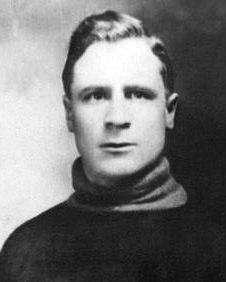
Louis Dieudonné Berlinguette, last name occasionally spelt as Berlinquette, was a Canadian professional ice hockey left winger who played eight seasons in the National Hockey League for the Montreal Canadiens, Montreal Maroons and Pittsburgh Pirates. He also spent six seasons with the Canadiens in the National Hockey Association prior to the inception of the NHL.
The 1917 Stanley Cup Finals was contested by the Pacific Coast Hockey Association (PCHA) champion Seattle Metropolitans and the National Hockey Association (NHA) and Stanley Cup defending champion Montreal Canadiens. Seattle defeated Montreal three games to one in a best-of-five game series to become the first team from the United States to win the Cup. The series was also the first Stanley Cup Finals to be played in the United States, and the last Stanley Cup Finals to not feature a National Hockey League team, as the NHA rebranded as the NHL in November 1917.
The 1919 Stanley Cup Finals was the ice hockey playoff series to determine the 1919 Stanley Cup champions. The series was cancelled due to an outbreak of Spanish flu after five games had been played, and no champion was declared. It was the only time in the history of the Stanley Cup that it was not awarded due to a no-decision after playoffs were held.
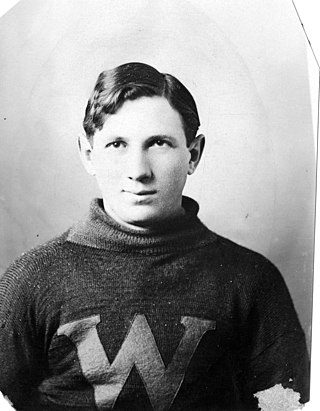
Linton Muldoon Treacy, better known as Pete Muldoon, was a Canadian ice hockey coach. He was the coach of the Seattle Metropolitans from 1915 to 1924 and led the team to a Stanley Cup championship in 1917. Muldoon later became the first coach of the Chicago Black Hawks. He was known for reportedly putting a curse on the Black Hawks after he was fired at the end of the 1926–27 season.
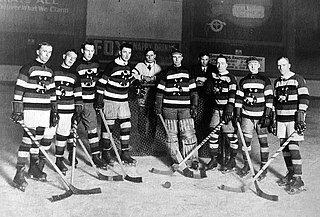
The 1919 PCHA season was the eighth season of the professional men's ice hockey Pacific Coast Hockey Association league. Season play ran from January 1 to March 10. The season was increased to 20 games per team.
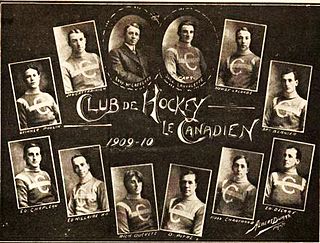
The Montreal Canadiens ice hockey club, formally Le Club de Hockey Canadien, was founded on December 4, 1909. The Canadiens are the oldest professional hockey franchise in the world. Created as a founding member of the National Hockey Association (NHA) with the aim of appealing to Montreal's francophone population, the Canadiens played their first game on January 5, 1910, and captured their first Stanley Cup in 1916. The team left the NHA and helped found the National Hockey League (NHL) in 1917. They returned to the Stanley Cup Finals in 1919, but their series against the Seattle Metropolitans was cancelled without a winner due to the Spanish flu pandemic that killed defenceman Joe Hall. The Canadiens have won the Stanley Cup 24 times: once while part of the National Hockey Association (NHA), and 23 times as members of the NHL. With 24 NHL titles overall, they are the most successful team in league history.
The 1918–19 Montreal Canadiens season was the team's tenth season and second as a member of the new National Hockey League (NHL). The Canadiens would win the NHL title and go to Seattle to face off for the Stanley Cup. However, a Spanish flu epidemic broke out in Seattle and both teams would abandon the series after several Canadiens fell ill. Montreal defenceman Joe Hall would die from the flu.
The 1924–25 Montreal Canadiens season was the team's 16th season and eighth as a member of the National Hockey League (NHL). The Canadiens once again made it to the Stanley Cup Finals but lost to the Victoria Cougars.
Ice hockey in Seattle, Washington, includes professional teams as early as 1915, such as the Seattle Metropolitans, the first United States-based team to win the Stanley Cup. The city has been represented by various teams in the iterations of the Western Hockey League (WHL) since 1944, of which the major junior Seattle Thunderbirds are the latest. Presently, the city has a National Hockey League (NHL) franchise, the Seattle Kraken, who began play in the 2021–22 season.









